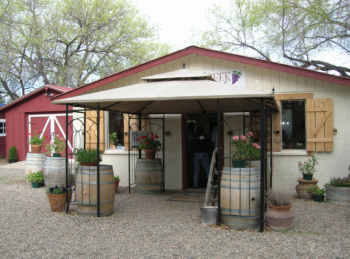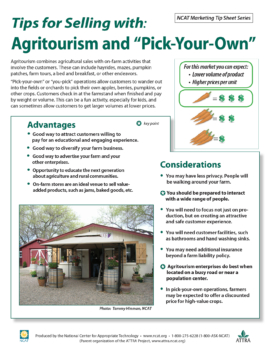Tips for Selling with Agritourism and “Pick-Your-Own”
NCAT Marketing Tipsheet Series
By Marisa Alcorta, Rex Dufour, and Tammy Hinman, NCAT

Photo: Tammy Hinman, NCAT
Agritourism combines agricultural sales with on-farm activities that involve the customers. These can include hayrides, mazes, pumpkin patches, farm tours, a bed and breakfast, or other endeavors.
“Pick-your-own” or “you-pick” operations allow customers to wander out into the fields or orchards to pick their own apples, berries, pumpkins, or other crops. Customers check in at the farmstand when finished and pay by weight or volume. This can be a fun activity, especially for kids, and can sometimes allow customers to get larger volumes at lower prices.
For this market you can expect:
- Lower volume of product
- Higher prices per unit
Advantages
- Good way to attract customers willing to pay for an educational and engaging experience.
- Good way to diversify your farm business.
- Good way to advertise your farm and your other enterprises.
- Opportunity to educate the next generation about agriculture and rural communities.
- On-farm stores are an ideal venue to sell value-added products, such as jams, baked goods, etc.
Considerations
Agritourism enterprises do best when located on a busy road or near a population center.
- You may have less privacy. People will be walking around your farm.
- You should be prepared to interact with a wide range of people.
- You will need to focus not just on production, but on creating an attractive and safe customer experience.
- You will need customer facilities, such as bathrooms and hand washing sinks.
- You may need additional insurance beyond a farm liability policy.
- In pick-your-own operations, farmers may be expected to offer a discounted price for high-value crops.
Agritourism Tips
Have “something to see, something to do, something to buy.”
- Feature children’s activities such as petting zoos, pumpkin picking, arts and crafts, or picking out a Christmas tree with the family.
- An internet presence can help advertise your operation, its location, what it has to offer, and times of operation.
- Provide adequate parking, restrooms, and signage.
- Consider hosting a festival focused on a particular farm product or activity, such as a lavender festival, harvest festival, planting celebration, etc.
- Check with your chamber of commerce or economic development office to connect to local or regional tourism promotion.
- Be prepared for folks who trip and fall, and absolutely carry at least $2 million in liability insurance.
Key Questions to Ask Yourself
- Do I like entertaining and having people at my farm?
- Can I keep my farm tidy and hazard free?
- Is my farm located on a road with enough traffic or close enough to a busy population center to generate customers?
- Can I put up sufficient signage to alert drivers and give them time and space to pull off the road?
- Do I have space for parking?
- What permits and extra insurance do I need?
Resources
- California Agritourism Directory shows agritourism operations in the state, searchable by county. The directory provides detailed contact information and farmers can add their farms to the list.
- Local Harvest website lists and describes all kinds of farms that sell direct to the public. Browsing here will give
you a good sense of what farmers across the country are doing. The website currently has about 800 listings nationwide for Pick-Your-Own farms—mostly for small fruits. - East Coast Agritourism 2010 webinar series.
- National Agricultural Law Center compiles information about specific agricultural and food law topics.
- UC Small Farm Program: Agritourism website provides links to California case studies.
- Vermont Agritourism Collaborative
- North American Farmers’ Direct Marketing Association promotes direct marketing, agritourism.
This tip sheet was developed with assistance from Dina Izzo, Bludog Organic Produce Services
Tips for Selling with Agritourism and “Pick-Your-Own”
© 2012 National Center for Appropriate Technology—NCAT
By Marisa Alcorta, Rex Dufour, and Tammy Hinman
IP429
This publication is produced by the National Center for Appropriate Technology through the ATTRA Sustainable Agriculture program, under a cooperative agreement with USDA Rural Development. This publication was also made possible in part by funding from USDA/NIFA/OASDFR. ATTRA.NCAT.ORG.

